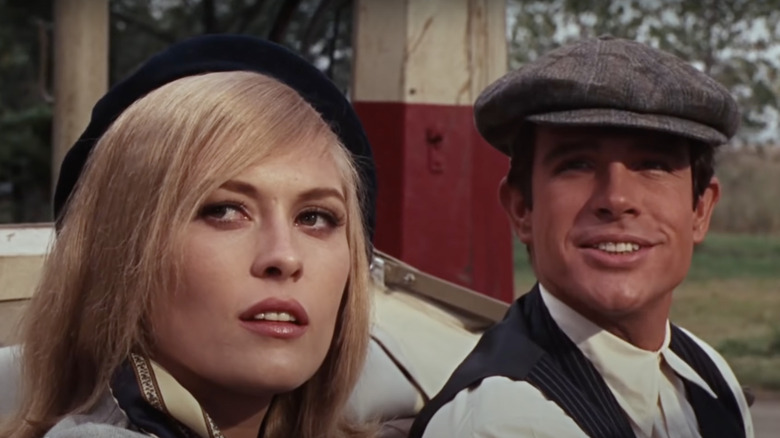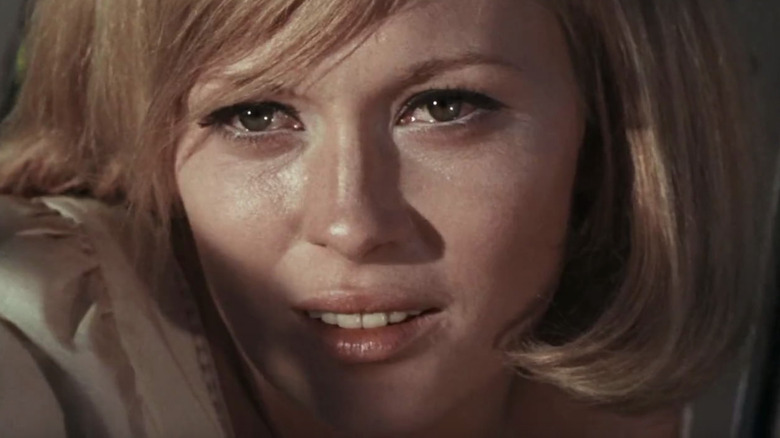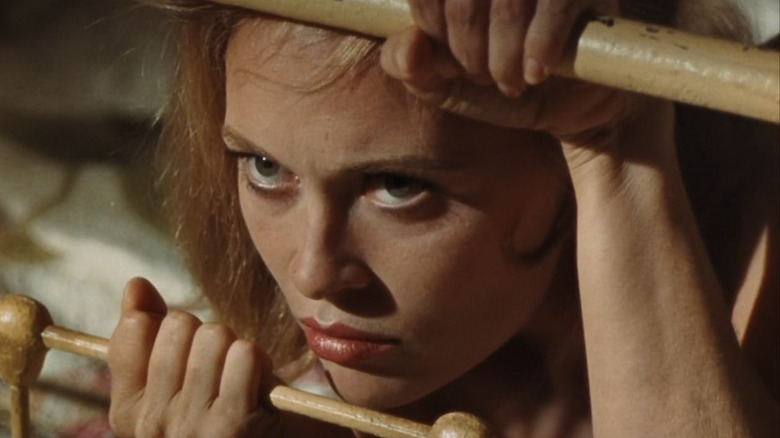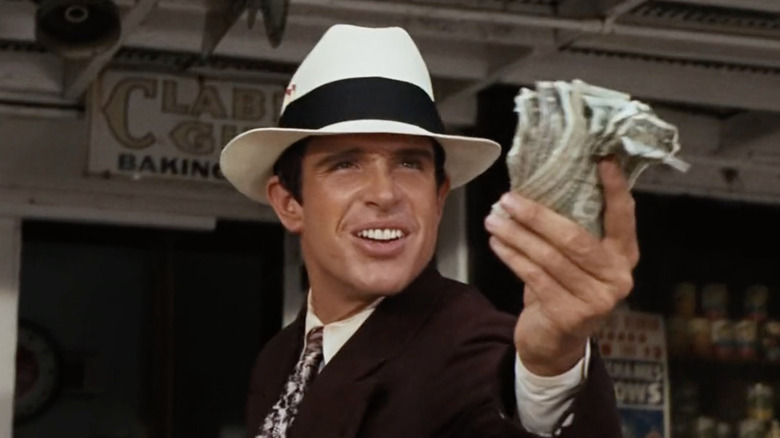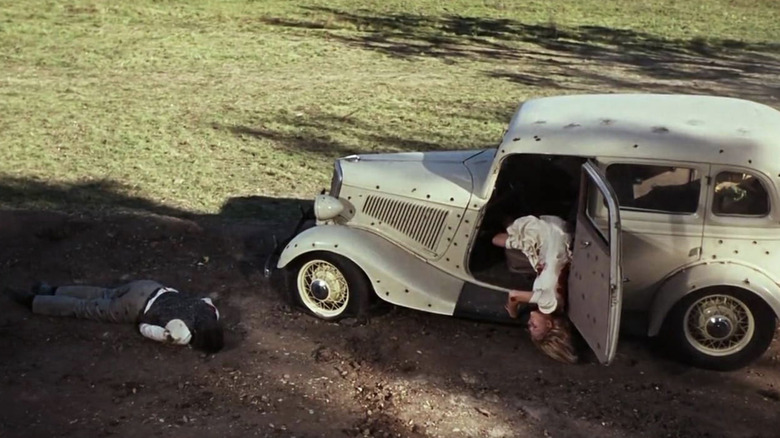Bonnie And Clyde Ending Explained: You Made Me Somebody
The Depression era crime spree of Clyde Barrow and Bonnie Parker has become the stuff of legend. The notorious couple made headlines by stealing money when the rest of America was struggling to survive with sporadic jobs and meager earnings. Bonnie and Clyde became Robin Hood figures in the press, heroes that stood up to "the man" by stealing back what had been taken from the public. Decades before the introduction of the 24-hour news cycle, the controversial Bonnie and Clyde became one of the most infamous and celebrated criminal couples in history.
The image of two outlaws, barely out of their teenage years, robbing banks and riding off into the sunset is an intoxicating one. The myth around the notorious couple has been immortalized in countless works of art, including a 1967 film directed by Arthur Penn. Instead of depicting the couple as heroic figures out to avenge the poor, the film shows Bonnie (Faye Dunaway) and Clyde as restless and insecure 20-somethings, who had an overwhelming attraction to violence and crime.
The death of Bonnie and Clyde is often misinterpreted as the tragic end of a loving couple, but Penn's film sheds a very different light on the duo's bullet-laden, blood-soaked ending.
How Bonnie and Clyde Ends
After a shootout with police that leaves Buck Barrow (Gene Hackman) dead and Clyde (Warren Beatty) wounded, the gang hides out at C.W. 's father's house. After learning of his son's association with the wanted criminals, Ivan Moss (Dub Taylor) goes to the police, and offers them a deal. He'll help set a trap for Bonnie and Clyde if they give his son a light sentence. The duo's long trail of crime and death has made the police desperate to stop them, so they agree to his terms.
At the end of the film, the couple are driving down a narrow road, presumably on their way to their next crime, but they pull over when they see Ivan tending to a flat tire. Clyde gets out of the car and walks over to Ivan, while Bonnie waits in the car. Suddenly, a flock of birds fly out of the trees lining the road, spooked by the police hiding in the forest. Ivan ducks under his truck and gives the cops a clear shot at the couple. Knowing their time is up, the couple shares one last look before gunfire explodes from the trees.
This last gaze between Bonnie and Clyde is poignant. Some have interpreted it to be a loving one, a silent celebration of their time together, and a mutual acceptance of their fate. I'd argue for a more cynical interpretation: The insecure Clyde is happy that he will die a legend, one half of a notorious bank robbing duo, and the adventurous Bonnie accepts her fate because she lived an exciting life far away from her poor, small town. The final gaze is a glance shared by two killers who fed off of each other's boredom, narcissism, and lust for violence.
Bonnie's restlessness
Instead of embracing the romantic legend that surrounded Bonnie and Clyde during their lives, Penn's film introduced America to two young adults who were desperate for attention and validation during the crushing despair and poverty of The Great Depression. At the start of the Warren Beatty movie, Bonnie is a bored waitress, stuck in a poverty stricken town. Her whole life changes when she wanders over to her bedroom window and finds Clyde waist deep in the window of her mother's car. Instead of freaking out, Bonnie is intrigued. She jumps into a stolen car with Clyde and runs away with him. She's excited by the bad boy energy, and sees Clyde as a fast route to a life of danger and excitement.
Instead of perpetuating the myth of a couple who deeply loved and protected each other, Penn's film shows that Bonnie was a restless, dissatisfied waitress, who found excitement in a life of crime with Clyde. The initial meeting of a naked Bonnie and a smirking Clyde has sexual undertones — her lustful gaze and erotic caress of his gun is as suggestive as any sex scene — but the couple have a much stronger lust for violence than each other. Clyde is impotent, so the couple don't engage in any form of sex for the majority of the movie. Instead, they express their carnal urges and gain satisfaction from robbing banks, shooting at police, and getting their names in the paper.
This need for adventure and overwhelming attraction to increasing brutality culminates in their gory demise — a fitting end for such over-the-top, sadistic fiends.
Clyde's impotence and insecurity
More neo-noir biographical drama than a thriller movie, "Bonnie and Clyde" is unafraid to paint its titular criminals in a negative light. During their initial meeting, Bonnie doubts Clyde's criminal past, accuses him of being all talk, and challenges him to use his gun in a crime. He hesitates at first, but Clyde eventually gives into the pressure and robs the store to prove himself to a woman he's just met. This action tells us a lot about Clyde and his self-esteem.
Once he's accused of being a "faker," he feels pressured to show Bonnie otherwise, which is a dynamic that continues throughout the film. This interaction hints at a deep self-esteem issue for the young thief, who isn't confident enough in himself to stand up to Bonnie and shrug off her influence. Instead, his crimes and violence increase, and his desperate need to prove himself leads to their downfall.
After hooking up with Bonnie, Clyde attempts a bank robbery but fails miserably. Bonnie ridicules him by laughing hysterically as they rush away from the scene. Defeated and ashamed, Clyde tries again, this time, with Bonnie at his side. This heist ends even worse than the last when their amateur getaway driver, C.W. Moss (Michael J. Pollard), gets stuck in a parking space, and Clyde shoots a bank employee in the face so they can escape. This fateful event is the point of no return for the couple, which ultimately seals their fate.
Why Bonnie and Clyde has such a bloody end
After one last shared glance, Bonnie and Clyde are pumped full of bullets at the movie's end, and reduced to lead filled bodies in the middle of nowhere. In the real world, the bloody conclusion of the couple transformed them into the literal definition of a "ride or die" couple that symbolizes unconditional love and loyalty, but Penn's ending questions that perspective.
Generally, watching the main protagonists of a film lay dead and bloody would elicit sympathy from audiences, but that's not what Penn's ending generates. On the contrary, after spending almost two hours watching Bonnie and Clyde rob and kill to satisfy their need for importance and excitement, the savage ending seems appropriate. After all, they aren't Romeo and Juliet, two innocents caught up in a nasty feud between their families, they are selfish killers who enjoyed the ego boost and elation of committing violent crimes.
Despite the glorified image of Bonnie and Clyde, their selfish need for attention, adventure, and violence were only ever going to end one way: in a hail of bullets and newspaper headlines.
